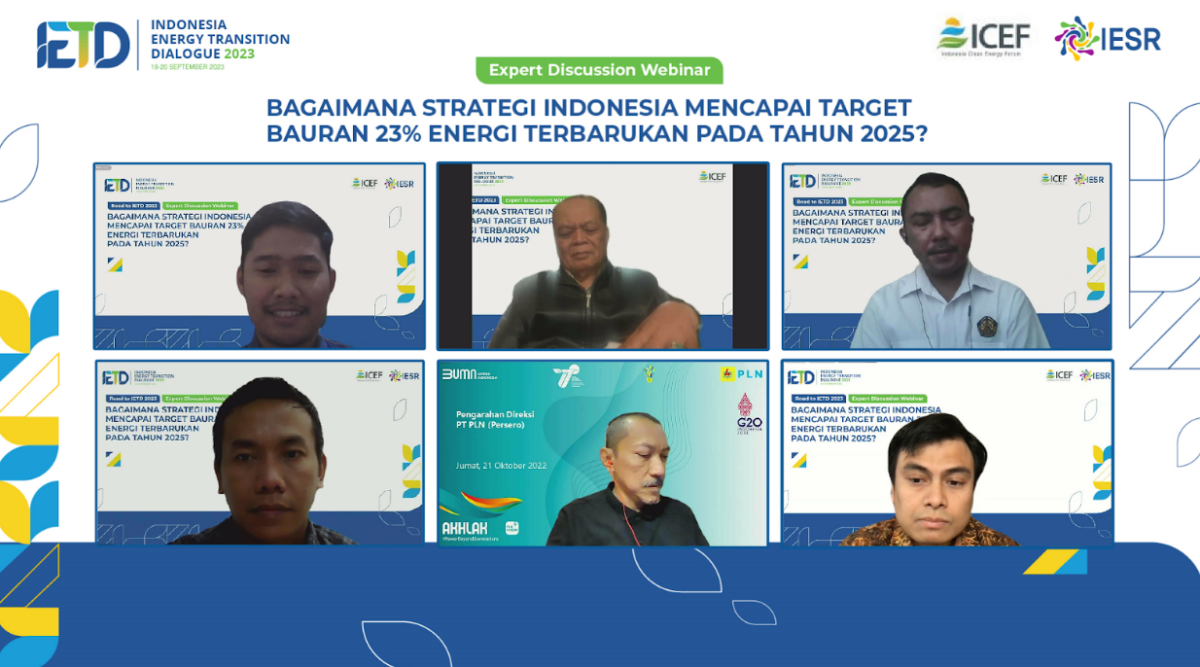Jakarta, July 27, 2023 – The Institute for Essential Services Reform (IESR) and the International Clean Energy Forum (ICEF) hosted an expert discussion webinar to discuss the strategies to achieve 23% renewable energy in 2025. The online discussion is part of the Road to Indonesia Energy Transition Dialogue (IETD) which will be held on 18-20 September 2023 in Jakarta.
Deon Arinaldo, Manager of Energy Transformation in IESR, explains a little about IETD. IETD is an annual event that consistently supports a dialogue for policy recommendations to reform energy transition in Indonesia. Furthermore, Deon emphasizes the importance of strategy refinement to reach 23% of renewables in 2025.
“Indonesia already had a strategy to reach its renewables target; one of them is to develop renewables generators in the electricity supply sector and increase biofuel generation to replace biodiesel. However, the available generations are utilizing more hydro and geothermal, and to develop both generations in 2 years would be impossible. Therefore, we need other strategies,” stated Deon.
His Muhammad Bintang, a Researcher of IESR, mentions the current condition of renewables development in Indonesia. Although the country has its target, Indonesia has yet to utilize its renewable potential effectively since 2018, and none of the targets have been achieved.
“Since 2018, renewables development in Indonesia has not achieved a single target, yet each year the target increases. One of the causes is the low utilization of renewables. Solar and wind power has only been utilized up to 0,02% if we compare them to their potentials and up to 0,03% if bioenergy is included in the renewable energy generations,” said Bintang.
Herman Daniel Ibrahim, the representative of the National Energy Council (DEN), stated that the 23% renewables target had been calculated by the DEN and the Ministry of Energy and Mineral Resources (MEMR), and it could be achieved with the assumption of Indonesia utilizing bioenergy and bioethanol. Unfortunately, the utilization of bioethanol is never realized.
“If the 23% target is only for the electricity sectors, Indonesia has reached up to 15-20%. Alas, the target is for primary energy generation, while electricity is the only sector that can be accelerated. The most viable technology to reach 23% is through Solar PV,” said Herman.
Mustafa Ari Suryoko, Coordinator of VRE Program Preparation from MEMR, presented that in the last half-decade, the development of renewables generation has been hindered by the action of fossil fuels generation. Although it is increasing, it is unseen. To reach 23% in 2025, Indonesia will need the proper renewable generation and can rapidly develop, like Solar PV.
“From the government’s side, we can reach the target through stakeholder collaboration. Furthermore, we have to ensure the implementation of solar PV and harmonize policy,” said Mustafa.
In recent years, renewable energy development in Indonesia is still hindered by the 35000 GW generation project and is currently adapted with RUPTL. Zainal Arifin, EVP of VRE from the National Electricity Corporation (PLN), mentioned that PLN adjusts the generation target with the Indonesian Nationally Determined Contribution (NDC). Because of the delay, PLN will extend the target until 2030 to generate 20,9 GW of renewable energy.
“RUPTL is trying to adapt the renewable energy target caused by the 35000 GW projects of RUEN, and we can see the end goal in 2030. Renewables generation currently in construction is 5,3 GW, and we will add another 1,3 GW. The generation within the process of COD an extension from 2021-2022 is around 835 MW, and we can achieve around 7-8 GW by 2025,” state Arifin.
From the civil society perspective, Aris Prasetyo, the Deputy of Economy and Business Desk, Harian Kompas, highlighted how energy transitions are considered exclusive, as the language and phrases used within are difficult to understand.
“If we use difficult terminology or are too technical, it will make our messages about energy transition hard to receive by the public. This is homework for every stakeholder, including the media, to make energy transition narratives easier to understand. For example, climate change is still difficult to understand, although the impacts are real. Then how can we take action if the public did not receive our messages?” said Aris Prasetyo.
Dr. Raden Raditya Yudha, Senior Researcher of IESR, agreed with Aris that the terms used while presenting energy transition are technical and challenging to understand to the public. Raditya expresses the need for storytelling through relevant analogies to make people understand more about energy transition narratives, as this topic is essential to overcome climate change.
“In energy transition, the main importance is to generate more renewables and retire coal-fired power plants. However, it is equally important to consider the supply chain infrastructure and capacity building for the workers,” said Raditya.

